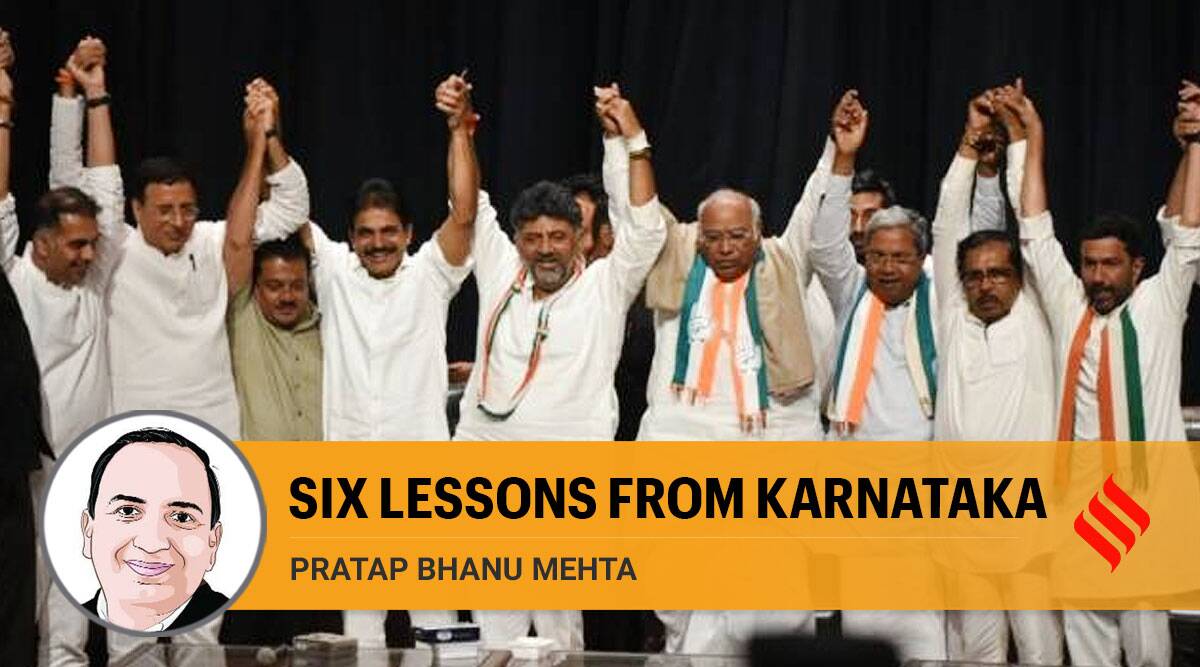
What are some of the implications of the Congress’s emphasis and creditable win in Karnataka for national politics? At one level it would be unwise to extrapolate from state to national elections. The logic of these elections is not always aligned. Nevertheless, the Karnataka results has implications for how we understand the evolution of national politics.
The first and perhaps most important lesson is that BJP will find it, in most places, harder to win genuinely bipolar contests, where third parties in the state decline. This is for a simple reason that in a bi-polar contest, the BJP has to polarize more of Hindu votes and in some cases, as many as, 50 per cent to win. Even in most communalized of states that is a tall order. Not all the J D (S) votes shifted to the BJP. But the fact is that the Karnataka elections became de facto less tri-polar. So the question is, whether this condition can be successfully replicated elsewhere, not just at the level of a state but the local level. This is no guarantee of success. But de facto bipolar contests are at least one of the enabler for an opposition victory.
The second trend to observe is that the Opposition’s best hope is to chip away at BJP’s governance. The Karnataka BJP had scored too many own goals for it to be rescued. It did more or less everything wrong. It has a chief ministerial face, who did not have a mass base or even command over the party. Increasingly, the BJP is going to face this challenge. The theory of the BJP model, like the model of good governance in all regional parties that have endured, is not to reduce corruption. The model is to centralize corruption. This also has the advantage of cutting out intermediaries for most services. You can then combine this with a couple of schemes to project good governance. Increasingly, the BJP is finding it hard to hold onto this aspiration and getting stuck in the quicksand of intermediaries. Part of this is driven by venality, as politics often is; but part of this is driven by the need to placate different constituencies (as we are increasingly seen in Haryana). This also makes it vulnerable. As the party expands, it paradoxically becomes more brittle at the state level. But this will also be a challenge to the incoming Congress government.
The third lesson is the consistent welfare story. One of the most remarkable shifts in Indian politics has been the expansion of the welfare state. This has different fiscal implications in different states. Frankly, these are far more significant than caste, which was often an endogenous response to the absence of any other form of politics. But most states now have fiscal resources to send creditable welfare signals to their constituents. This is true across all states, from Ashok Gehlot in Rajasthan to Mamata Banerjee in Bengal and Naveen Patnaik in Odisha. Much of this welfarism is for good; it is universal in character, mostly directed at goods and forms of fiscal support that are empowering and should be looking at as long-term investments, rather than as handouts.
The fourth lesson is the clear divide between the politics of privilege and the politics of the poor. One of the remarkable things about the Congress victory in Karnataka is that support for it cuts across classes. But, at least, in Karnataka, there is overwhelming evidence that the minorities, the socially and economically marginally groups supported the Congress in far greater proportion. The big question is whether this divide portends a national fault that can be exploited. Or rather the question to be asked is under what conditions the messaging can this become a national fault line?
The fifth reason is that it is too immature to talk of the repudiation of Hindutva by Karnataka voters. There is a rather simplistic binary that we often use: Was it Hindutva or was it governance? This is an unproductive way of posing the question. Political competition is about creating credibility on a broad front. If the BJP had administratively governed better, Hindutva would have been consolidated as a consequence. You could pose the question the other way round. Despite a government that, by all account, was a disaster, the BJP has still managed to hold onto its vote share in Karnataka. Even in a campaign where everything went wrong, the long-term changes the BJP has brought about in cultural preferences should worry us. The most you can say is that just Hindutva alone will help you retain a base but not push you over the margins of victory. This is small comfort. But it will not be enough to secure either Karnataka or India from the rising tide of communalism.
The sixth lesson is that political identities are not over-determined by social identity. Even the success of Hindutva was premised on unsetting existing social identities, and exploiting the opportunities provided by the individualization of the voter. (IPA Service)
The post Karnataka Shows Bipolar Contests Enabler Of Opposition Victory first appeared on IPA Newspack.


